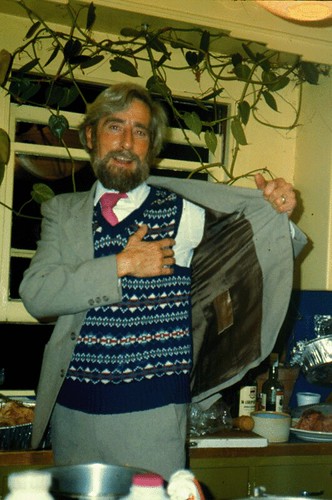David Bromige, unarmed
Today is the birthday of one of my favorite poets, ever, David Bromige.
Bromige is one of those people of whom I haven’t written nearly as much here as I ought. He has been one of my primary influences for some 27 years, ever since I first ventured with my friend David Perry¹ over to Paul Mariah’s poetry reading series at the Albany Public Library, then on
Whoever stood furthest up the trail was the master
of the trail, which for the most part climbs
through a beautiful if crowded forest, though the final
four or five hundred yards rise
above the tree-line, across tricky scree, & ends
at that peak, which is also the scarp-edge, a steep
&, despite the rumors, inaccessible, drop
on one side, the shallow slope on the other, where the wood
grows, that is mainly conifers.
meant, to gather all those things the ownership of which
proves masterhood, a tribute
all other travelers are bound to pay.
I was forced to admit, right there at the outset, that this was a facility with syntax & with syntax’ relation to the line, I would never fully have, no matter how long I practiced or hard I tried.
Bromige originally may have come to this focus in his poetry as a result of his early fascination with, work on, and friendships with the likes of Robert Duncan, Charles Olson & Robert Creeley, but this focus extends far deeper & further than questions of influence could imply. One could argue that Bromige took them considerably further than all of his early masters, even as he himself came less to be identified with Projectivism as such & more with language poetry. I think in part that this is because he showed that he could attain such mastery & set it all aside, his imagination was/is so restless, that he could write works that removed all the elements with which he was so identified, just to see what remained if & when. Thus a prose poem composed of slightly refiltered reviews of his work:
My poetry does seem to have a cumulative, haunting effect – one or two poems may not touch you, but a small bookful begins to etch a response, poems rising in blisters that itch for weeks, poems like ball-bearings turning on each other, over & over, digging down far enough to find substance, a hard core to fill up the hand. It’s through this small square that my poems project themselves, flickering across the consciousness, finally polarizing in the pure plasma of life.
“My Poetry,” the title work in the book of the same name, continues on in this vein for another ten pages, identifying a discursive mode as texture, which is the real content of the poem.
One could write about David Bromige in terms of his relationship to language poetry, the Projectivism, even to the phenomenon of New Western poetry – he’s a contemporary of Drum Hadley, Bill Deemer, David Meltzer, Jim Koller & the rest – as well as to western Canadian poetry. Any one of these approaches would be interesting & revealing, yet none would completely capture what has been so consistently unique about his work. If anything, it’s that constant questing, combined with the complete mastery of whatever new task he’s taken on. Nowhere else in my generation will you find it quite like this.
Have a great birthday, David.
¹ Not the poet who currently lives in






